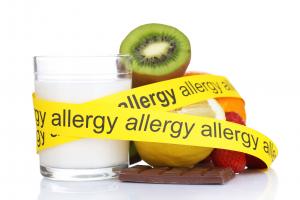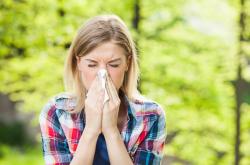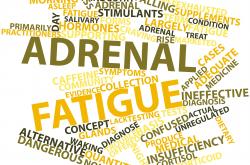Tiredness And Common Food Allergies
What are food allergies and why are they important to understand if you’re suffering from tiredness or chronic fatigue? How can you diagnose, treat and overcome them?

What are food allergies?
Food allergies are reactions to substances which occur as a result of immune-related mechanisms. An example of an allergic reaction (though not provoked by food) is hay fever in which grasses or pollens produce a variety of symptoms including itching nose and eyes, sneezing and runny nose. Food intolerances (hypersensitivities), on the other hand, are not immune-related and tend to happen after a viral or bacterial infection of the intestinal tract.
Understanding food allergies is important as most people with severe fatigue or CFS (chronic fatigue syndrome) have significant food allergies. Although most allergies can be traced back to a problem in the intestinal tract, the symptoms can manifest anywhere in the body e.g. fatigue, sore chest, wheezing, heart palpitations, anxiety, headache, muscle pain.
Why should you be concerned about food allergies if you are suffering from tiredness?
Tiredness can be caused or increased by food allergies. This is because the adrenal glands are usually involved with any case of chronic exhaustion. The adrenals produce cortisol, which is one of the major anti-inflammatory hormones in the body. When there are continual challenges to the immune system in the form of allergies, histamine is produced. Cortisol then damps it down.
If you frequently eat foods which you are allergic to, then your adrenals will be working overtime to produce cortisol. Eventually, they will become overtaxed and depleted. Adrenal fatigue is a common cause of tiredness and can accompany both chronic fatigue syndrome and hypothyroidism (please, seeAdrenal fatiguefor more details on this point).
In addition, there is some evidence that allergies cause inflammation of the lining of the intestinal tract and interfere with the absorption of nutrients, in particular antioxidants. They can also cause bloating, diarrhea, gas and abdominal pain. If you are trying to recover from chronic tiredness, then nutritional absorption is very important, which is a good reason for dealing with any allergies as soon as you can.
What foods cause allergies?
Common food triggers are:
- Wheat
- Soya
- Sugar
- Corn
- Eggs
- Peanuts
- Cow’s milk and dairy products
- Corn
- Preservatives, colorants and additives.
It is thought that we get allergic to foods we eat often. If you think back to humankind’s hunter-gatherer past, you will realize that people didn’t eat the same thing every day. It would have been very much a matter of chance what was found and therefore consumed. Therefore allergic reactions didn’t have the chance to build up.
Another factor is that until fairly recently agriculture wasn’t as standardized as modern agribusiness has become. Farmers grew local varieties of crops, so again there were lots of differences in what was eaten day to day, thus fewer opportunities for allergies to develop. Now we tend to eat what we like and, because it’s available, we can do so. Unfortunately, what we particularly like and indeed crave for, are often the foods to which we have become allergic. Quite often these are substances added to make food tastier or to prolong its shelf-life. These additives can be toxic to us.
There are two types of food allergies: acute reacting and slow reacting or delayed hypersensitivity. Acute reacting allergies (IgE) develop immediately the trigger food is eaten and the symptoms are impossible to miss: red eyes, wheezing or tight chest, and rash. Slow reacting allergies (IgG) are built up over time and are often triggered by common foods such as: wheat, soya beans, cow’s milk, dairy products, pine nuts, corn, oats and eggs.
You can test for each group of allergies through the food elimination diet test (explained in detail inTests and Diets for Food Allergies.] However, it’s worth bearing in mind that any food can trigger a reaction – these are simply the most common ones.
Preservatives, colorants and additives are often tricky to detect in food. It pays to read the label, but manufacturers have gotten wise to this and sometimes term colorants, for example, as ‘natural’. They may be natural, because they are derived from nature, but they may not be natural to the particular food that they are coloring.
There are three additives that are particularly worth avoiding – MSG, Aspartame and Sulfites. MSG (monosodium glutamate) is a flavor enhancer, which is often used in Chinese and other foods. It can produce a range of allergic symptoms, the most concerning perhaps being that it causes excess calcium to flood into the brain cells, making them swell and sometimes even die.
Aspartame (NutraSweet TM) is found in many ‘diet’ foods. It is an excito-toxin and has been found to cause neurological damage. Anyone suffering from a mood disorder (major depression etc.) should avoid it as it can make symptoms much worse. It is often found in cola type drinks along with another additive it is sensible to avoid, phosphoric acid, which can cause an increased loss of magnesium.
Sulfites are bleaching agents which are commonly found in processed food, for example, packaged potato products, dried fruit, drugs and wine. Asthmatics seems particularly at risk from sulfites.
What are the signs that you have a food allergy?
Some foods trigger an immediate reaction, while others appear to create a delayed onset allergic reaction.
Immediate reactions often include:
- Itchy eyes
- Runny nose
- Wheezing
- Difficulty breathing
- Difficulty in swallowing
- Hives.
These can be detected by an IgE RAST (Radioallergosorbent test). The delayed onset reactions can take a little longer to manifest and are sometimes picked up by an IgG Food sensitivity Assay. The symptoms of delayed onset allergic reaction include:
- Fatigue
- Sore chest
- Lung problems and breathing difficulties
- Heart palpitations
- Anxiety
- Headaches
- Exercise-caused muscular pain
- Fuzzy thinking and brain fog
- Sinus draining problems and sinusitis
- Skin problems
- Headaches
These symptoms are more difficult to detect because by the time they onset, some hours or days may have elapsed since eating the food, which has caused the allergy. This is why the elimination diet is so powerful because it takes each major allergic group in turn and evaluates whether or not they cause allergies in the sufferer.
To sum up
Allergies can be detected and should always be suspected if you are suffering from long-term tiredness.













Leave a comment